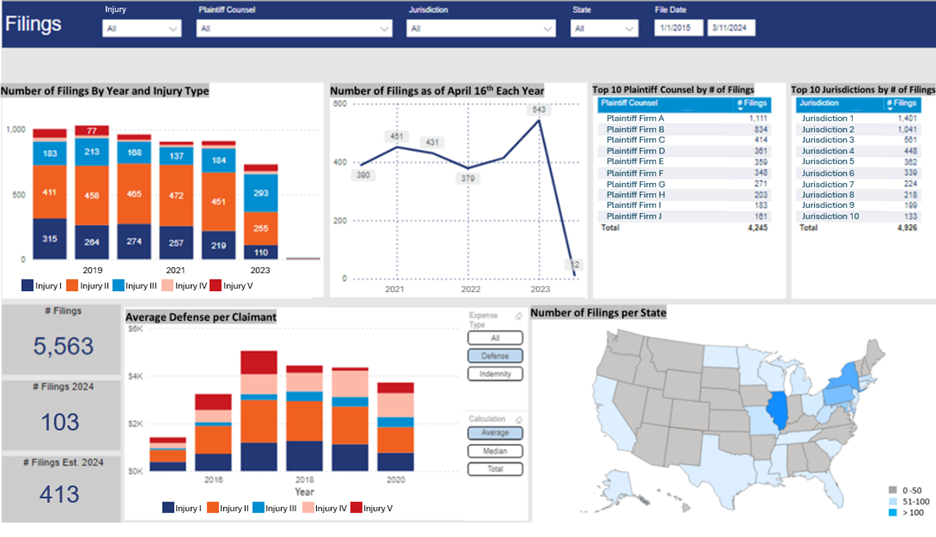
In recent years, there has been a notable increase in product liability litigation involving pharmaceutical and medical device companies. Consequentially, it has also become more challenging for defendants to effectively manage these cases.
Drug and medical device cases are often centralized using multidistrict litigation (MDL), which is intended to make mass tort litigation more efficient by grouping similar cases together to reach a resolution faster. Although there have been fewer MDLs granted in recent years, the average number of actions per MDL has grown drastically. In a review of statistics provided by the Judicial Panel on Multidistrict Litigation (JPML) as of May 2024, there are 21 MDLs with 1,000 or more pending actions (the majority of these relate to drug and medical device litigation). Recent estimates have shown that over 70% of the federal civil caseload reside in MDLs.
While companies can work to reduce their exposure to product liability litigation by implementing risk management protocols and safety measures, new strategies must be put in place if litigation arises.
Technology tools can be key to managing the kinds of heavy caseloads that are common in mass tort litigations, such as drug and medical devices. KCIC has been providing consulting services and deploying technology solutions for defendants since 2002. In this blog, we will focus on three tools we provide defendants and their counsel: reporting dashboards, triaging, and email automation.
Reporting Dashboards
Managing case data in mass tort litigation, class action lawsuits, and/or MDLs can be a daunting task. Live reporting dashboards are a powerful tool to help manage datasets that are constantly evolving. In addition to showing cases on an individual level, dashboards provide a broader picture perspective that can help drive defense strategy. They can include case trends based on key datapoints such as jurisdiction, product, plaintiff firm, and more. Dashboards are customizable based on the client’s broader objectives. They are also interactive, so that users can filter and manipulate the data based on their short-term needs.
In MDLs, the discovery process utilizes a plaintiff fact sheet (“PFS”) to submit information to defendants. Defense firms then review served PFSs to identify any deficiencies. If deficiencies are found, the plaintiff will need to cure the PFS in order to avoid dismissal of the claim. The use of live data dashboards can help make this process more seamless by allowing defense firms to view all PFS datapoints in one place and more easily identify what data is missing. They can also track the timeline of curing deficiencies, so that defense counsel can be alerted when a motion to compel or dismissal is appropriate.

Triaging
A component of MDLs are bellwether trials, where a subset of cases are selected for trial in order to better determine the trajectory of the litigation. In a voluminous docket, it can be difficult to identify which key cases are best suited to proceed to bellwether trials.
Triaging dashboards use key datapoints to pinpoint potentially high-value cases, group similar cases, and assess other metrics to assist with the bellwether selection process.

Email Automation
Since defendants in drug and medical device litigation often have lawsuits across many jurisdictions, they are likely managing a large network of defense firms. With many parties involved, it can be difficult to ensure that defense firms are receiving all the information they need in a timely fashion.
KCIC's email automation capabilities can separate data based on the responsible defense firm, as well as notify firms of case changes in real time.
At the onset of a case filing, defense firms are notified of a new complaint served in their jurisdiction. As the case progresses, email automation can be used for case status updates, trial set dates, other case deadlines, deficient PFSs, payment status, and more. These automated emails can ease the load off the client and counsel, streamlining communication and increasing efficiency.
Interested in learning more about KCIC’s technology solutions? Feel free to reach out and we would be happy to walk you through a demonstration.
Never miss a post. Get Risky Business tips and insights delivered right to your inbox.

Kathrin Hashemi is a litigation management expert who partners with Fortune 500 and mid-market companies to navigate the complexities of mass tort litigation. With a decade of experience, she has focused her practice on helping clients obtain actionable insights from their litigation data. By leveraging advanced technology and deep case expertise, Kathrin enables her clients to manage case filings and resolutions efficiently, optimize insurance recoverability, and streamline litigation processes. She prioritizes listening to her clients, understanding the legal and contextual nuances of their cases, and providing data-driven strategies tailored to their unique needs.
Learn More About Kathrin
Jazmin has utilized her vast technical, data analytics, and team management skills to lead a variety of projects at KCIC. Since joining KCIC in 2018, she has participated in and led projects in claims administration, insurance coverage litigation, insurance policy reviews, insurance allocations, and future liability forecasts for asbestos and talc defendants.
Learn More About Jazmin